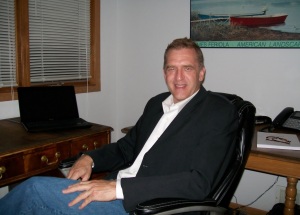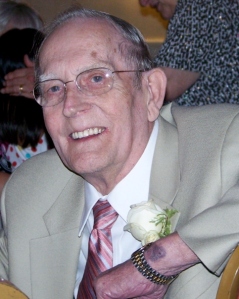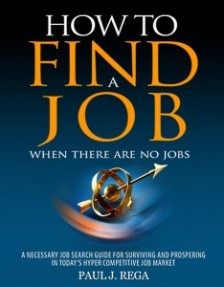
This blog is written by my friend Paul Rega. He is the author of an exciting new book titled, “How To Find A Job When There Are No Jobs”. In this blog, Paul writes about the Intuitive Personal Assessment which I endorse for anyone looking for a career whether you are a high school or college student, or have been in the workforce for many years. As a career coach, I talk to many people who are unemployed that don’t want to go back to the career they have just lost but don’t know what they want to do. The Assessement shows them the job they were meant to have.
Throughout most of my life, I have been on a journey towards the identification, development, and implementation of my personal career path. Many years ago, my father introduced me to the concept of establishing and setting goals. He had developed a very sophisticated goal system and each Thanksgiving would have a series of goal-setting meetings with his business partner. Being involved in my own business for many years, I have incorporated much of what he has taught me into my personal life and career planning sessions.
Utilizing my personal and business experience as an executive recruiter since 1984, I have developed a unique twelve-step career assessment and goal setting process called “Intuitive Personal Assessment,” or IPA. The twelve steps and exercises of the IPA process will guide and assist you with the discovery, acceptance and implementation of your desired career path. The IPA self-assessment program utilizes your intuition and incorporates your ideas, skills, interests, values and life experiences to determine your career path.
The goal setting segment of IPA is based on the principle of establishing and maintaining balance in all of life’s seven components, including Health, Family, Knowledge, Relationships, Spiritual, Financial, and Career. Balance is the key to life’s longevity, and by achieving balance in your life, your career will prosper. Setting goals and taking action to achieve them as they relate to the components of the IPA process will enable you to visualize and accomplish your career objectives.
The IPA personal assessment program is an excellent resource for anyone who wants to discover his or her unique career path. After completion of the twelve-step IPA process, you will be equipped with the knowledge needed to determine your career path and the tools in the form of goals needed to implement your job search plan.
The current job market is a tremendously competitive environment. Many individuals, who have recently lost their jobs often have very similar job skills and will be seeking a limited number of positions. Only those who have a clear understanding of their desired career path and are armed with the proper skills and job search knowledge will be successful in their search.
When searching for a new job, most individuals are doing so for one of two reasons. They are either dissatisfied with their current job, or they have been laid off or fired from their current position. They may be unhappy with the type of work they are doing or dislike the company environment in which they work. They may have a personality conflict with their boss, or salary and benefits issues that can’t be resolved. The reasons for an individual’s job dissatisfaction are endless.
This book is intended to serve as a guide for those individuals who either want to make a career change or for those who are literally forced to make a change and are looking for a new job. The current-day perception of the job market is that there are fewer good paying jobs and more people competing for the same positions. Many US companies continue to export thousands of jobs to foreign countries and as a result have dramatically restructured their businesses and have downsized their work force. Thousands of individuals out of work with similar job experience are thus infused into an already hyper-competitive job market.
When searching for a new job, time is always your enemy; you must start your job search immediately once you are out of work. Should you be privy to company layoffs or you decide to leave your present company, it is important that you begin your job search as soon as you are able to do so. Far too many people I have known through my executive search business have mistakenly decided to wait more than two weeks, to almost a year to start their job search. Some made a decision to take time off from work or even took extended vacations.
Competition for new jobs is very fierce in today’s economically tight environment with fewer quality well-paying jobs available. As an executive search recruiter with over twenty-eight years of industry experience, I strongly recommend against taking an extended vacation should you leave your current company. Time away from work may sound like a good idea, perhaps to regroup and charge your batteries. However, it could prove to be a very costly mistake, especially if several people from your company with similar work experience are also laid off. My advice is that you take a day or two to get organized and gather your thoughts, and then move immediately towards your goal of locating a new position before your competition has time to act.
Begin to ask yourself the following questions: Do I enjoy the work I was doing at the previous company? Does the work challenge me? Am I doing something that I feel is important? Was the environment, culture and location of the company suited to me as an individual? Do I want to work for a small, medium or large company? What personality traits am I looking for in a boss and my co-workers? These are questions that will help you to mentally prepare yourself to begin your job search.
Paul Rega is president of Paul J. Rega & Associates, a retained executive search firm he founded in 1985. He is well-known throughout the business community as an executive search professional and career coach. His new best-selling book, How To Find A Job: When There Are No Jobs hit the #1 position in Job Hunting books in the country, surpassing “What Color is Your Parachute.” The book continues to be one of the most downloaded books on Amazon with over 13,500 downloads during a 3-day promotion. It rocketed to #1 Job Hunting, Careers & Resumes, #2 Nonfiction and #2 Business & Investing. It was also ranked in the Top 20 at #14 on Amazon Kindle.
Paul holds a Bachelor of Science degree in Biology with a minor in Journalism, having attended the University of Illinois and Western Illinois University. He began his writing career while attending Western Illinois University as a staff reporter for the Western Courier. Prior to establishing his executive search firm, Paul held the position of Chemical Marketing Manager with Fisher Scientific Company, a division of Allied Chemical where he sold and marketed food and pharmaceutical grade chemicals. He currently lives with his fiancée in a small town along the Gulf Coast of Florida where he is working on his next book, a novel and coaches his children in soccer, one of his other passions in life.
AMAZON: http://www.amazon.com/dp/B0056PFONW
Twitter: http://twitter.com/paulrega
Facebook: http://www.facebook.com/people/Paul-Rega/1636494613
LinkedIn: http://www.linkedin.com/pub/paul-rega/2/403/523
Author: www.amazon.com/author/paulrega
Web: http://www.howtofindajobwhentherearenojobs.com
Web: http://www.paulrega.com
Arleen Bradley has two certifications in career coaching and certification in the Job-Loss Recovery Program . She assists clients in moving beyond job loss grief in order to land dream jobs using the Job-Loss Recovery Program. The Job-Loss Recovery Program uses guided imagery to achieve results. To learn more about it and how you can benefit from it, log on to www.arleenbradley.com. Or send me an email at [email protected].






